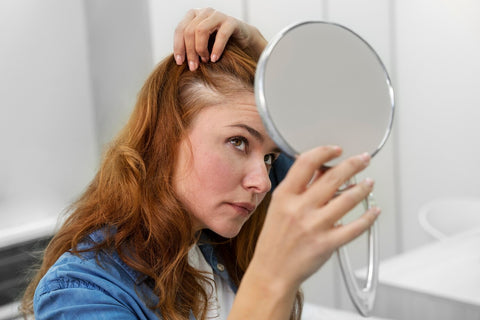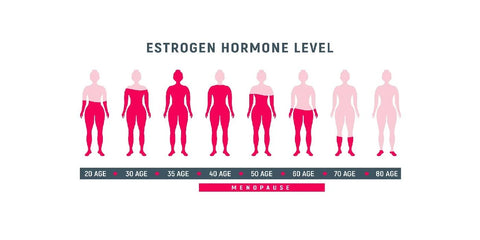Menopause is a natural stage in every woman's life, usually around the age of 50. During this period, there is a drop in estrogen levels that will affect various areas of health, including sexuality. The drop in estrogen levels (which can begin as early as perimenopause ) can decrease libido (sexual desire) and increase vaginal dryness. In another of our posts, we gave you a series of tips to improve vaginal dryness during menopause, which can help you enjoy sex.
It is true that this does not happen overnight, but rather it is usually a gradual process , in which the discomfort may be mild and increase and the low libido may fluctuate. It is important to be aware that these symptoms are due to the hormonal decline, which can help us understand what is happening to us.
However, it is a myth that menopause means the end of your sex life . In fact, many women find that they can continue to enjoy a full and satisfying sex life after menopause.
At Madequa we want to remind you that sex does not have an expiration date , sexuality does not end at menopause. Many women find that menopause gives them the opportunity to explore their sexuality in new ways, without the worries of an unwanted pregnancy. It is essential to stay informed, open to new experiences and seek medical help when necessary .
The question often arises:
What is “normal”?
Behind any discussion of sexual issues lies an incredibly loaded question: What exactly is normal, healthy sexual response and function?
The World Health Organization defines sexual health as "a state of physical, emotional, mental and social well-being in relation to sexuality; it is not merely the absence of disease, dysfunction or infirmity."
A more exact definition may be difficult to come by, as normal sexual response and function is about as individual and personal as it gets. Each person has his or her own concept of sexual health or satisfaction, based on his or her culture, background, personal sexual experiences, and biological makeup.
Libido, sexual desire and menopause
Although in another of our posts we talked about menopause and libido , it is important that you understand what libido is, since it is closely related to sex, as it is nothing other than the desire for sexual pleasure. As a behaviour, libido is the response to sexual attraction, and feeling sexual attraction is completely natural. Thus, female libido is a state that involves women's hormones (such as estrogen ) and different chemical reactions that take place in the central nervous system.
Estrogens, libido and menopause
Libido (sex drive) is not the same in all women, nor does it remain constant at all stages of their lives. The first factor that affects female libido is a woman's age. Thus, when menopause occurs, the amount of estrogen produced by the female body decreases, which also decreases sexual desire. Estrogen plays a crucial role in vaginal lubrication and in the elasticity of vaginal tissues, which can affect comfort during sex.
Sexuality does NOT end during menopause
Sexuality is an integral part of human life . It is not only related to reproduction, but also to pleasure and intimacy. Sex declines with age, partly due to misinformation and the belief that sexuality is only for young people. However, many men and women continue to have sex even at older ages.
Sexuality changes with age, just like all other physical abilities . In women, there are also physical and psychological changes that occur during menopause, which can negatively affect sex. However, there are treatments and therapies that can help mitigate these effects.
Problems with sex during menopause
Some problems with sex that women may experience during menopause include:
- Having pain during sexual intercourse.
- Not getting aroused or having no desire during sex.
- Not having an orgasm during sexual intercourse.
- Not wanting to have sex.
What causes sexual problems during menopause?
Sexual problems during menopause can be caused by many factors . For example, a woman may have sexual problems if:
- You have problems with your partner or in your relationship.
- She feels unhappy or bad about herself.
- Lack of awareness of one's own body.
- Lack of sexual information.
Problems with sex during menopause can also be related to physical events in a woman's life. Certain conditions can cause problems with sex :
- Medical disorders, such as cancer or heart problems.
- Mood disorders, such as depression.
- Vaginal dryness or pain.
- Pain in the lower abdomen, such as from a previous infection or surgery.
- Changes in the muscles near and around the vagina.
Sexual problems can also be a side effect of certain medications . For example, medications to treat heart disease or depression.
Below we offer some tips to achieve more satisfying sex during menopause.
How to have more satisfying sex during menopause?
- Open Communication : Talking openly with your partner about your needs and concerns can strengthen intimacy and enhance the sexual experience.
- Lubricants: Using water- or silicone-based lubricants (sold over the counter) or a cream (usually estrogen-based) can both reduce vaginal dryness and make sex more comfortable and pleasurable.
- Hormonal Therapy: Talking to a doctor about hormone therapy may be an option for some women. This therapy can help balance estrogen levels and improve libido.
- Exercise and Healthy Diet : Staying active and eating a balanced diet can improve overall well-being and sexual health.
- Relaxation and Stress : Practicing relaxation techniques such as yoga or meditation can reduce stress, which in turn can improve sexual desire.
- Get treatment for mood problems .
- Work with your doctor to change the medications you take that could be causing sexual problems.
- Perform physical therapy to loosen the muscles around the vagina so that you do not feel pain during sex. Or perform Kegel exercises , since having a toned pelvic floor can greatly help sexual relations.
- Phytotherapy treatments can be helpful.
- Undergo sexual and couples therapy if necessary.
Conclusion
Menopause can bring significant changes, but it doesn't have to mean the end of sex. With the right information and support , you can continue to enjoy fulfilling, satisfying sex .
Sex and menopause can coexist harmoniously , and this stage can be an opportunity to rediscover yourself and enjoy a new phase of intimacy.
At Madequa we recommend you take a look at the AEEM (Spanish Association for the Study of Menopause) guide on life and sex , where you can find very detailed information on the subject. As well as on our Madequa blog, where you will find many more related topics.
References
Life and Sex beyond 50. MenoGuide AEEM. First edition: April 2014. Aureagràfic, s.l. Barcelona 2014. ISBN: 978-84-940319-6-0.
Spanish Consensus on Sexual Health in Men and Women over 50. Maturitas. 2014 June; 78(2): 146-150
Buster JE. Managing female sexual dysfunction. Fertile Steril. 2013 Oct;100(4):905-15. doi: 10.1016/j.fertnstert.2013.08.026.
Shifren JL, Hanfling S. 2019. Sexuality in Midlife and Beyond: Special Health Report. Harvard Health Publications, Boston, MA.
Sexual Problems at Midlife. North American Menopause Society. 2024.
Pelvic Floor Muscle Exercises (Kegel) for Women. Memorial Sloan Kettering Cancer Center.
West SL, D'Aloisio AA, Agans RP, Kalsbeek WD, Borisov NN, Thorp JM. Prevalence of low sexual desire and hypoactive sexual desire disorder in a nationally representative sample of US women. Arch Intern Med. 2008 Jul 14;168(13):1441-9. doi: 10.1001/archinte.168.13.1441
Shifren JL, Monz BU, Russo PA, Segreti A, Johannes CB. Sexual problems and distress in United States women: prevalence and correlates. Obstet Gynecol. 2008 Nov;112(5):970-8. doi:10.1097/AOG.0b013e3181898cdb




Comments (0)
There are no comments for this article. Be the first one to leave a message!